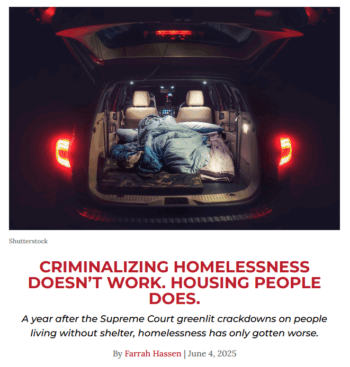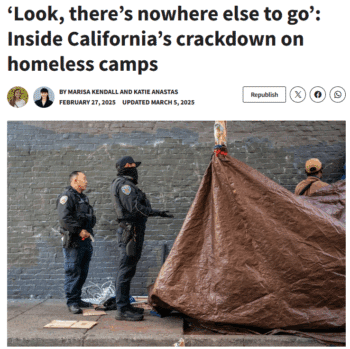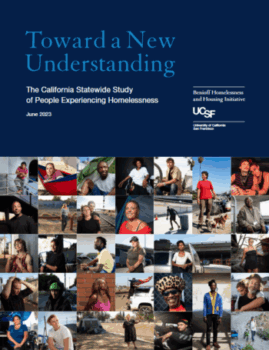
Former New York Mayor Rudy Giuliani
Janine Jackson interviewed Cal Poly Pomona’s Farrah Hassen about criminalizing homelessness for the June 12, 2025, episode of CounterSpin. This is a lightly edited transcript.
Janine Jackson: In 1999, then—New York City Mayor Rudy Giuliani declared that “streets do not exist in civilized societies for the purpose of people sleeping there. Bedrooms are for sleeping.” He added that the right to sleep on the streets “doesn’t exist anywhere. The Founding Fathers never put that in the Constitution.”
That absurd out-of-touchness, the failure, not merely of empathy, but of knowledge? Our guest reports that still seems to undergird much of what we are told are policies and laws meant to address homelessness, including at the highest levels.
Farrah Hassen has been tracking the issue for years. She’s a writer, policy analyst and adjunct professor in the Department of Political Science at Cal Poly Pomona. She joins us now by phone from Sacramento. Welcome to CounterSpin, Farrah Hassen.
Farrah Hassen: Hi, Janine. Thanks for having me.
JJ: I want to ask you about Grants Pass v. Johnson, last year’s Supreme Court case that you wrote about recently for OtherWords, but I’d like to start, as you do, with the acknowledgement that ought to anchor every story we see: that a person who works full time and earns a minimum wage cannot afford a safe place to live almost anywhere in the United States. That’s the reality, that’s the understanding that any of our responses ought to take on board, or to be judged by, yes?

Other Words (6/4/25)
FH: That’s correct. I mean, we have to consider that backdrop if we are going to talk about the growing problem of homelessness, and the related housing crisis. And, unsurprisingly, homelessness has increased as our government has diminished social safety nets. And we have to consider that when we think about how people fall into homelessness.
JJ: So rather than respond with a commitment to housing and social services, and job and wage growth, what we’ve seen is criminalizing. I couldn’t find it, but I remember Rudy Giuliani saying that he hoped that his crackdown on unhoused people would lead to them just going away, just sort of disappearing. And that seems to be some of the thinking behind, if not the Grants Pass ruling, some of the support for it. So tell listeners a little about what Grants Pass, that decision, did, and then, what didn’t it do?
FH: A year ago, on June 28, in the City of Grants Pass v. Johnson, the Supreme Court ruled that local governments can criminalize people for sleeping outside, even if there is no available shelter. The Supreme Court overturned the 2018 Martin v. Boise precedent that had been decided by the Ninth Circuit Court of Appeals, which had said that the Eighth Amendment’s “cruel and unusual punishment” clause prohibits cities from penalizing unhoused people for sitting, sleeping or lying outside on public property unless they have access to adequate temporary shelter.
And so, for some context, in Grants Pass, like other cities across the United States, the number of people living unhoused easily exceeds the number of available shelter on any given night. Debra Blake was among those Grants Pass residents who were forced to live outside—in her case, for eight years—after losing her job and housing. Moreover, her disability disqualified her from staying in the town’s only shelter. And the city had these anti-camping ordinances that prohibited people like Debra Blake from sleeping or camping in the public, and they interpreted “camping” to even include the use of bedding, like a blanket, to stay warm in the cold.

Cal Matters (2/27/25)
Anyone who violated these ordinances in the city could be ticketed, could face fines, even subject to criminal prosecution. And the Grants Pass City Council themselves revealed that the underlying goal of these ordinances was to “make it uncomfortable enough for unhoused people in our city so they will want to move down the road.”
And so in Debra Blake’s case, after being banished from every park, accruing thousands in fines, she sued the city of Grants Pass as part of this class action suit, for violating unhoused residents’ constitutional rights. And the Oregon District Court agreed in 2020 that the city’s actions constituted cruel and unusual punishment.
But, sadly, Blake never got to see the results. And the city of Grants Pass ended up appealing this decision all the way to the Supreme Court, which ruled in the city’s favor.
And which brings us back to today. And I should also note, going back to the Supreme Court’s decision, that, importantly, it did not say, “Therefore, state and local governments must now criminalize homelessness.” But because the high court found Grants Pass’s anti-camping ordinances constitutional, many jurisdictions, unfortunately, including in California where I live, have used the court’s decision as a green light to crack down on people living unhoused, including by passing these “anti-camping ordinances,” similar to Grants Pass, which broadly criminalized the act of sleeping or pitching tents or other structures on publicly owned property.
JJ: It’s clear that the issues of homelessness involve many societal factors other than housing. And, at the same time, there’s an Occam’s razor at work here. There’s a reason that “housing first” lands as a call, isn’t there? For people who think, “Well, it’s very complicated. It’s about mental health, it’s about family structure” or whatever, housing first makes a lot of sense, if folks would just think of it that way, yeah?

Benioff Homelessness and Housing Initiative (6/23)
FH: That’s absolutely correct. There is a misconception that homelessness is primarily caused by addiction and mental illness—which is not to say, to be clear, that there are not people suffering from mental illness and addiction among our nation’s unhoused population.
But there was this landmark study in June 2023 by the University of California San Francisco that focused on California, and it found that poverty and high housing costs are, in fact, the driving forces of homelessness. And that’s just more confirmation that housing unaffordability is the primary cause of homelessness, as other research and experts have long noted.
And that’s why, therefore, using the findings of this evidence, punitive fines, arrests, sweeps of encampments do not address the root of the problem, which is, again, the absence of permanent, affordable and, I might add, adequate housing. And so there are more things our country can do instead of criminalizing homelessness, which only traps people into these cycles, these endless cycles of poverty and homelessness, not to mention criminal penalties being inhumane to begin with.
And so housing first, as you mentioned, is one proven, evidence-backed solution here. It prioritizes providing permanent housing as soon as possible to individuals and families experiencing homelessness, without preconditions. It’s in contrast to what some people want, which is treatment first, or treatment only. Housing first also is coupled with voluntary supportive services to help improve housing stability and well-being, especially for those people who may need additional support, additional treatment.
And housing first has had strong bipartisan support for decades. It’s been supported by the Department of Housing and Urban Development and other agencies. And there’s so much evidence that shows that housing first actually works, including in places like Houston, Texas, which notably reduced homelessness by nearly two thirds over a decade. So that’s just yet another example of why, instead of kicking people while they’re down, housing support, combined with other voluntary services, really helped to lift people back up.

Farrah Hassen: “We have to look at this as a government failure, instead of constantly pointing back at people living unhoused, and blaming them for their plight.”
JJ: I’ll just only ask you, finally, Farrah Hassen, if you see a particular role for news media here, either for good or for ill, in terms of consideration of this question, which I want to ground folks in the statement that you have in the piece, “Homelessness is solvable in our lifetime.” It’s not bending laws of nature, it’s just informed effort. And I wonder what role you think news media might play there.
FH: Oh, thank you. I really do appreciate that question, because underlying that question is, I believe, a larger narrative of how we talk about housing in this country. And you would never know that it’s actually a well-defined and internationally protected fundamental human right that all people—not people who have to be means-tested, or meet certain qualifications—all people are entitled to. Why? Because we all know innately, looking at our own lives, that housing is essential to life, to health, to well-being, but in the United States, it has primarily treated housing as a commodity, and it’s failing to protect this right for large numbers of people.
Homelessness itself, the sheer fact that over 770,000 people last year experienced homelessness, a record high, directly violates this right to adequate housing. So we have to look at this as a government failure, instead of constantly pointing back at people living unhoused, and blaming them for their plight, as if there are not larger structural factors at play that contribute to housing remaining perpetually unaffordable for more and more people living in this country.
And so obviously the U.S. doesn’t recognize housing as a human right, but I believe we should talk about it more, like we do about the need for Medicare for All, which is rooted in healthcare for all. We need these economic, social and cultural rights, along with civil and political rights, to really be able to live our lives to the fullest. And, fundamentally, that means transforming our nation’s approach to housing policies, and to remember that people shouldn’t be punished as well, as we look back on homelessness, for living in public spaces. People should not be punished for existing.
JJ: I’m going to end on that note. We’ve been speaking with writer, policy analyst and adjunct professor at Cal Poly Pomona Farrah Hassen. Thank you so much for joining us this week on CounterSpin.
FH: Thanks so much, Janine.

